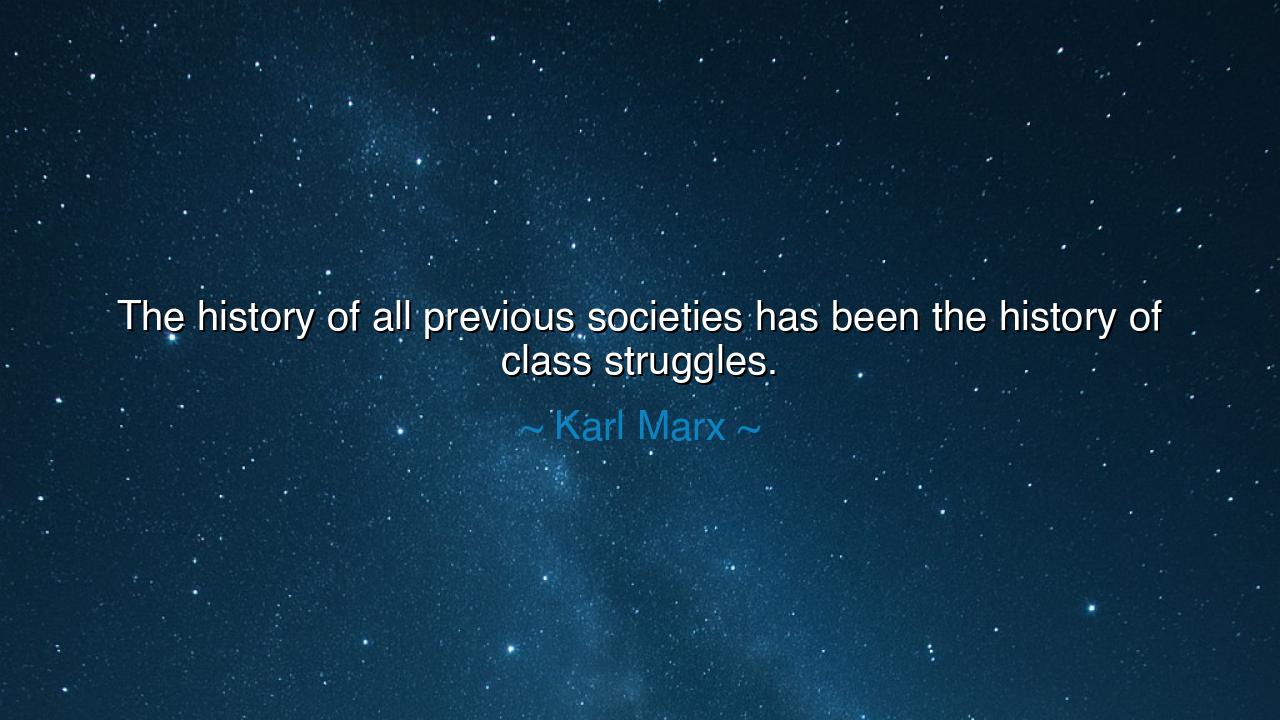
The history of all previous societies has been the history of






In the thunderous words of Karl Marx, the prophet of revolution and the interpreter of human struggle, we hear this immortal truth: “The history of all previous societies has been the history of class struggles.” These words, drawn from the opening lines of The Communist Manifesto in 1848, are not merely a statement of politics—they are a revelation about the eternal conflict at the heart of civilization. From the dawn of humanity, when the first villages rose from the dust, the world has been divided between those who command and those who labor, between the masters of wealth and the makers of it. Across the centuries, this conflict has shaped empires, destroyed kingdoms, and birthed revolutions.
To understand Marx’s words is to understand that history is not a tale of kings and conquests alone, but of the invisible struggles of the many against the few. Behind the marble palaces of the ancient world stood the sweat of the builder and the hunger of the slave. In the fertile fields of feudal Europe, the peasants sowed and reaped so that nobles might dine in splendor. Even in the modern age, the worker bends beneath the weight of industry, while those who own the machines grow rich from his labor. Marx gazed upon this endless cycle and saw a pattern older than nations—a rhythm of oppression and uprising, of class against class, that defined every age of man.
Consider, my listener, the tale of the French Revolution, when the oppressed rose against the opulent. For centuries, France had been a kingdom of glittering courts and starving streets. The aristocrats feasted while peasants withered. The poor were taxed to fill the vaults of kings who called themselves divine. Yet when hunger grew louder than fear, the people rose, and the old order fell beneath the cry for liberty and equality. It was not a random storm, Marx would say, but the inevitable breaking of the chains that bind one class beneath another. When injustice ripens to its fullest, history itself becomes the weapon of the oppressed.
Yet, Marx’s insight goes beyond rebellion—it is a mirror held up to human nature. The struggle between classes is not only fought in fields and factories, but within the human heart. The yearning for power, the fear of loss, the desire for freedom, the hunger for dignity—these forces drive the story of mankind. Each generation inherits not only the world’s wealth, but its injustices. The battle is reborn, reshaped by time, carried onward by new voices demanding what was long denied. From the slaves of Rome to the serfs of medieval Europe, from the coal miners of England to the workers of today, the cry remains the same: “We, too, are human. We, too, deserve the fruits of our labor.”
And yet, Marx’s words are not a hymn to hatred, but a call to awakening. He sought to open the eyes of men to the truth that systems built on exploitation cannot endure forever. The oppressor and the oppressed are bound together by fate—when one rises too high and forgets the other, collapse must follow. History, as he said, is the chronicle of this tension, the endless shaping and reshaping of societies struggling toward balance. Thus, every empire that falls, every movement that rises, is part of humanity’s slow march toward justice and equality.
But beware, my children of time, for the lesson of Marx is not one of destruction alone—it is one of responsibility. It is not enough to name the oppressor; one must also build the world that follows. The fire of rebellion must give way to the architecture of fairness, the chaos of uprising to the harmony of compassion. For if the oppressed, once freed, forget the humanity of their oppressors, then the cycle of class struggle will turn once more, and the tyrant will be reborn with a new face.
So take this wisdom as both warning and guidance: Do not close your eyes to inequality. Do not harden your heart to the suffering that sustains your comfort. The world is built by many hands, yet ruled by few. Let your awareness be the first act of justice; let empathy be your rebellion. Speak for those unheard, and act to balance the scales, for only then will the long struggle of classes give way to the peace of equals.
Thus, remember Marx’s words not as a curse, but as a map of the human journey. For as long as class struggles persist, the work of conscience remains unfinished. And if history is indeed written by conflict, let our age strive to write a new chapter—one where the war of classes yields to the brotherhood of humanity, and the story of struggle is finally transformed into the story of justice fulfilled.






AAdministratorAdministrator
Welcome, honored guests. Please leave a comment, we will respond soon